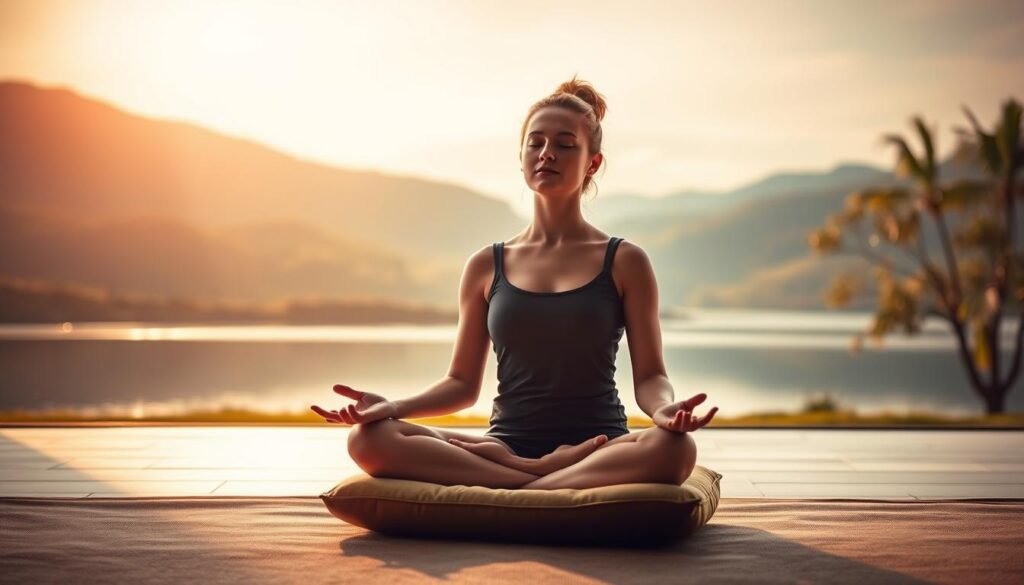Did you know self-care is essential, not a luxury? It’s key to thriving in today’s fast world. Simple wellness practices can change your life. Mindful breathing or a 10-minute walk can boost your energy and focus.
Self-care isn’t just about relaxing. It’s about taking care of all aspects of you. From exercise to journaling, these activities reduce stress and build strength. See how small, consistent steps can lead to big changes.
Key Takeaways
- Self-care activities improve mental and physical health by reducing daily stress.
- Wellness practices like gratitude journaling or yoga take minutes but offer long-term benefits.
- Self-love practices require personalized routines to address individual needs.
- Small actions, such as mindful breathing, prevent burnout and boost productivity.
- Incorporating these tips builds resilience without major lifestyle overhauls.
Understanding the Importance of Self-Care
Self-care is more than just a buzzword. It’s a key part of staying healthy. It means taking steps to keep your mind, body, and spirit in good shape. By focusing on self-care activities, you build up your strength against stress. This makes your daily life better.
What is Self-Care?
“Self-care is how you take your power back.”
This quote shows self-care as a way to take control. It includes things like exercise, mindfulness, or enjoying nature. These activities are not just treats. They are important for your health. For instance, a 10-minute meditation is just as valuable as a day at the spa.
Benefits of Regular Self-Care
- Improves mental health tips adoption, reducing anxiety and depression risks
- Boosts focus and productivity through better stress management
- Strengthens relationships by enhancing emotional stability
Common Misconceptions
Myth 1: Self-care is selfish. Fact: It’s crucial for keeping up with relationships and duties.
Myth 2: It requires money. Fact: Simple things like deep breathing or journaling are free and effective.
Myth 3: It demands hours daily. Fact: Even a short walk with mindfulness counts.
By clearing up these myths, people can see self-care as a useful, easy way to improve their wellness practices. It fits into any lifestyle.
Types of Self-Care Activities
Self-care is more than one thing—it’s a mix of practices for each person. Looking into these areas helps us focus on what we need. It gives us self-care ideas to improve our well-being.
| Type | Examples | Key Benefits |
|---|---|---|
| Physical | Exercise, nutrition plans, sleep routines | Improved energy, disease prevention |
| Emotional | Journaling, mindfulness, therapy | Stress management, emotional resilience |
| Social | Quality time with loved ones, setting boundaries | Stronger connections, reduced isolation |
| Spiritual | Meditation, volunteering, nature immersion | Enhanced purpose, inner peace |
Physical Self-Care Activities
Take care of your body with wellness practices. Do activities like yoga or walking. Eat well and sleep right. Also, don’t forget to see your doctor regularly.
Emotional Self-Care Activities
Work on your emotional health by dealing with feelings in a good way. Journaling or talking to a therapist are great self-care activities. Enjoying hobbies and practicing mindfulness also help.
Social Self-Care Activities
Good relationships need effort. Set boundaries, join groups, or hang out with friends. These actions are key to feeling connected.
Spiritual Self-Care Activities
Find meaning through meditation, helping others, or reading spiritual texts. These activities help you feel connected to something bigger than daily worries.
Creating a Self-Care Routine
Building effective self-care routines starts with planning. Follow these steps to create a routine that fits your life:
Assess Your Needs
First, figure out what you need. Ask yourself:
| Reflection Questions |
|---|
| What daily stressors impact my well-being? |
| Which self-care ideas energize me? |
| How much time can I realistically dedicate weekly? |
Set Realistic Goals
Make goals that you can achieve. Use SMART criteria:
- Specific: Pick personal development activities like daily walks or journaling
- Measurable: Keep track of your progress with weekly checklists
- Adjustable: Change your goals every two weeks based on how you’re doing
Incorporate Activities
Make self-care a part of your daily life with these tips:
- Link new habits to things you already do (like meditation before coffee)
- Set reminders on your calendar for self-care routines
- Save time each week for activities like yoga or hobbies
It’s not about being perfect. Start small and enjoy the little wins.
Mindfulness and Meditation

Mindfulness and meditation are key for good mental health today. They help us focus and reduce stress by keeping us in the present. Studies show they can even lower cortisol levels, a major stress fighter.
“Mindfulness-based interventions reduce anxiety by 30% through consistent practice.” — American Psychological Association, 2022
The Power of Mindfulness
Research shows mindfulness boosts our emotional control. A 2021 study in Psychological Science found daily practice makes us better at making decisions and handling emotions. These changes help us achieve long-term mental health goals.
Different Meditation Techniques
| Technique | Description | Benefits |
|---|---|---|
| Guided Meditation | Audio sessions with structured guidance | Reduces overwhelm for beginners |
| Body Scan | Focus on physical sensations from head to toe | Improves body awareness |
| Walking Meditation | Mindful movement with breath synchronization | Combines physical and mental practice |
Tips for Practicing Mindfulness Daily
- Start with 5-minute sessions using a timer app
- Incorporate mindful breathing during routine tasks like washing dishes
- Use journaling to track progress and reflect on challenges
Being consistent is more important than being perfect. Even a little bit of daily practice can make a big difference over time.
Physical Self-Care: Energize Your Body
Wellness starts with caring for your body. Activities like exercise, healthy eating, and rest help your mind and emotions. These habits make daily routines powerful stress fighters.
Importance of Exercise
Exercise should be fun. Try dancing, yoga, or gardening. Aim for 30 minutes a day, in short sessions if needed.
Regular activity boosts happiness, strengthens muscles, and improves heart health. Use apps like MyFitnessPal or Fitbit to stay on track.
Healthy Eating Habits
- Focus on whole foods: vegetables, lean proteins, and whole grains
- Hydrate with water and limit sugary drinks
- Listen to hunger cues instead of rigid diets
Eating well isn’t about being perfect. It’s about giving your body what it needs. Meal prep on Sundays to make healthy choices easier during busy weeks.
Getting Enough Sleep
Sleep is crucial for recovery. Create a bedtime routine: dim lights, avoid screens, and keep rooms cool. Adults need 7-9 hours.
Skipping sleep hurts focus and mood. Try weighted blankets or white noise machines to sleep better.
Nurturing Emotional Well-Being
Emotional well-being needs care to handle feelings and grow strong. These tips help you connect with yourself and others better.
Journaling for Self-Reflection
Journaling is a way to love yourself by understanding your feelings. Here are some ways to start:
- Emotion logs: Track what makes you feel certain ways to see patterns.
- Gratitude lists: Write down three good things each day to focus on the positive.
- Stream-of-consciousness writing: Write freely to clear your mind of thoughts.
Practices for Gratitude
Being thankful builds emotional strength. Try these activities to grow:
| Practice | How to Do It | Benefits |
|---|---|---|
| Gratitude Journal | Write five things you’re thankful for weekly | Reduces stress and boosts optimism |
| Gratitude Letters | Write (and send) a letter expressing thanks to someone | Deepens relationships and self-awareness |
| Mealtime Gratitude | Share one thing you’re grateful for at family meals | Encourages communal emotional bonding |
Seeking Professional Help
“Mental health tips often begin with acknowledging when support is needed,” says the American Psychological Association.
Seeing a therapist is a big step in personal growth. Look for these signs to get help:
- Feeling sad or anxious for more than two weeks
- Struggling to keep up with daily tasks
- Relationship problems that hurt your self-esteem
Online services like BetterHelp or local clinics are good places to start. Making mental health a priority is key to emotional well-being.
Social Connections and Self-Care
Strong social ties are key to holistic wellness. Meaningful relationships offer emotional support and build resilience. They are vital for both mental and physical health. By focusing on social connections, we improve our self-care and well-being.
The Role of Friendship in Self-Care
Friends are emotional anchors in tough times. Regular talks with trusted friends lower stress and increase joy. Sharing laughter and support strengthens personal growth through open communication and empathy.
Building a Support Network
Start small by joining groups or attending local events. Regularly reaching out is important. Here’s how to start:
- Attend neighborhood meetups or online forums that match your interests
- Stay in touch with loved ones by calling or messaging them weekly
- Volunteer for causes you care about to meet others who share your values
Engaging in Community Activities
Getting involved in community events helps you feel connected. Here are some self-care ideas:
- Join fitness classes or book clubs to meet new people
- Go to town halls or advocacy groups to get involved in civic issues
- Organize neighborhood cleanups or potlucks to build local connections
Spending time on social wellness practices helps us grow. Healthy relationships need effort and intention to thrive.
Creative Outlets for Self-Care
Doing creative self-care can change daily life into a chance for healing and growth. Activities like painting, crafting, or writing help us focus on ourselves. They make us feel better and build strength against stress.

Exploring the Arts
Art is a great way to take care of yourself, no matter your skill level. Here are some ideas:
- Painting or drawing to release emotions
- Listening to or creating music
- Attending theater or dance events
Benefits of Crafting and DIY Projects
Projects like knitting or pottery help you focus and feel less anxious. Crafting gives you:
- Tangible results that boost your confidence
- Chances to enter flow states
- Low-cost materials for affordable self-care
Writing and Other Creative Expressions
Writing lets you see your thoughts clearly. Try these ways to express yourself:
| Method | Benefits |
|---|---|
| Journaling | Clarifies emotions, tracks progress |
| Poetry | Encourages emotional articulation |
| Storytelling | Builds narrative perspective on life challenges |
“Creativity is a language the heart speaks before the mind translates.” – Anonymous
Remember, creativity is all about curiosity, not being perfect. Pick activities that make you happy. Let the process lead you to self-discovery.
Nature and Outdoor Activities
Getting into nature is a great way to reduce stress and improve well-being. Whether it’s a short walk or a weekend trip, being outdoors offers many self-care activities. These activities help both your body and mind.
The Healing Effects of Nature
Research shows that being outside can lower stress hormones and improve focus. Being near green spaces, water, or open areas triggers our body’s relaxation response. The attention restoration theory explains how nature helps us recover from mental exhaustion.
Biophilia shows our natural connection to living things. A 2023 study found that 89% of people felt less anxious after just 20 minutes of walking in nature.
“Nature doesn’t need humans, but humans need nature.” — Rachel Carson
Ideas for Outdoor Self-Care
- Take 15-minute daily walks in parks or trails
- Plant a garden for hands-on wellness practices
- Join guided hiking groups for social and physical engagement
- Practice yoga on a balcony or backyard
- Host sunset meditation sessions in open spaces
Planning a Nature Retreat
| Step | Action |
|---|---|
| 1 | Pick a location (local park, forest, or beach) |
| 2 | Set a timeframe (1 hour or multi-day trip) |
| 3 | Pack essentials: water, sunscreen, a journal |
| 4 | Include activities like birdwatching or photography |
| 5 | Reflect post-trip to track mental shifts |
Even city folks can enjoy nature. City parks or rooftop gardens are great places to find peace. Focus on making outdoor activities a regular part of your life for lasting wellness.
Technology Detox: Unplugging for Self-Care
In today’s world, it’s crucial to balance tech use with mental health. Too much screen time can mess with sleep, raise anxiety, and harm relationships. Learning to control digital habits is key for good mental health.
Understanding Digital Overload
Digital overload happens when too many notifications and tasks overwhelm us. Studies link too much screen time to more stress and less focus. Signs include feeling anxious without a phone and trouble relaxing at night.
“Reducing screen time by 30 minutes daily can improve sleep quality and emotional clarity.”
Strategies for Reducing Screen Time
- Set device-free hours, like no phones during meals or before bed.
- Use screen time trackers to monitor usage patterns.
- Create “tech-free zones” in your home, such as the bedroom.
Apps like Screen Time or Digital Wellbeing can help limit app use and track your progress. Small steps can lead to big improvements in mental health.
Reconnecting with the Present Moment
Swap screen time for mindfulness exercises, like deep breathing or walks in nature. Stress relief techniques, like journaling or yoga, help you focus. Doing hobbies, like reading, cooking, or art, brings you back to real-life experiences.
Try mindful pauses: take 5 minutes every hour to stretch or notice your surroundings without devices. This practice helps you stay in the moment, a vital part of self-care.
Building a Sustainable Self-Care Plan
Self-care is a journey, not a one-time task. It requires growth and change. By focusing on self-care routines, personal development activities, and self-love practices, you can build habits that grow with you.
Reviewing Your Progress
Use tools like journals or apps to track your journey. Ask yourself: What activities make me feel alive? Which ones are tough? Regular check-ins help you see what works and what doesn’t.
Sharing your insights with friends or a therapist can offer new perspectives.
Adjusting Your Activities
Life changes—work, goals, or seasons. When routines get old, try new things. For example, switch from jogging to yoga if your schedule changes.
Being flexible keeps self-love practices in line with your needs. Try new hobbies or apps like Headspace to keep things fresh.
Celebrating Achievements
Celebrate small wins, like keeping a sleep schedule or trying a new personal development activity. Treat yourself with something special—a quiet walk, a favorite meal, or a night off from screens.
It’s the effort, not perfection, that builds confidence. Acknowledging your hard work shows you’re committed to your well-being.
Maintaining self-care routines takes patience and kindness to yourself. By reviewing, adapting, and celebrating, self-care becomes a lifelong journey. Your well-being is worth the effort, one step at a time.



